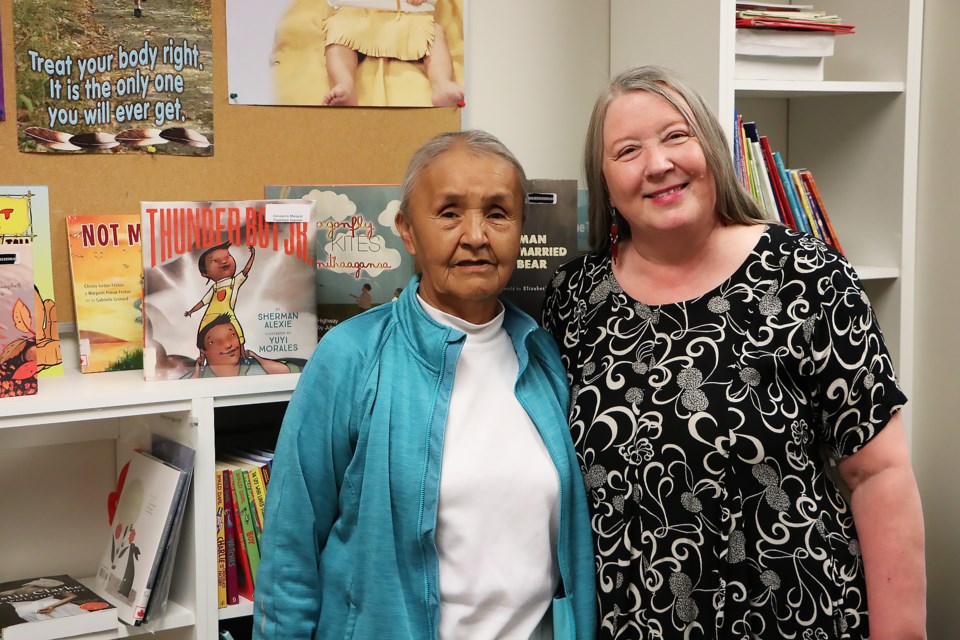ÎYÂRHE NAKODA – Once upon a time there was a laundry room that, with a little love and care from community members and the flick of a librarian's wand, was turned into a quaint library – the first of its kind in Mînî Thnî.
A new chapter in the Mînî Thnî Book Deposit’s roughly six-year history was written May 24 as over $750 worth of Indigenous book titles were added to the shelves.
“Most of the books that you see here, up until this point, I’ve bagged, borrowed or stolen,” said Rose Reid, librarian and Indigenous outreach specialist with the Marigold Library System.
“Books are not hard to find, but Indigenous books are hard to find, which is why this gift from Marigold and the Canmore Rotary means so much.”
With a book budget of $2,250 in hand, Reid, a Métis woman who got her start at the Exshaw Library about 30 years ago, split the donation and set out to help purchase books for not only the Mînî Thnî library, but also Nakoda Elementary School and Mînî Thnî Community School.
Late last month, community members gathered at Goodstoney Lodge – home of the library – and joyfully flipped through such titles as Tatanga Mani: Walking Buffalo of the Stonies by Grant MacEwan and These Mountains Are Our Sacred Places, written by the late Goodstoney (formerly Wesley) Chief John Snow.
Other historical titles added to the book deposit include The True Spirit and Original Intent of Treaty 7 by Dorothy First Rider and Sarah Carter, and based on the testimony of over 80 elders from the five First Nations in Treaty 7, including the three bands that make up Îyârhe (Stoney) Nakoda First Nation, Goodstoney, Bearspaw and Chiniki.
Several children’s books were also added.
“I had a whole list,” said Reid. “These were books that people said, ‘we need them, but we don’t have them.’”
Îyârhe Nakoda elder Jackie Rider, who works at the lodge, said she’s lost count of how many books she’s read taking lunch breaks in the library.
“When I first walked in here, what I started looking for was John Snow’s book, Walking Buffalo and books about other chiefs and elders like Frank Kaquitts Sr.,” said Rider. “We need to keep that history; those are the true things that we lived.
“I always tell my kids, ‘if you can find those books, read them. As much as we tell you about history, it’s all in there – we’re not making it up.’”
The rich history and captivating stories of the Îyârhe Nakoda have long been preserved through a cherished tradition of oral transmission. Across generations, parents and grandparents have played a pivotal role in passing down valuable knowledge to their descendants.
But over the years, Rider said, some things have been lost or misinterpreted.
“When I see some elders now, they’re taking it not how we were taught. It’s totally different from some of what you see written down in these books,” said Rider.
“For me, my kids, my grandchildren, we still hang on to that past. You don’t want to lose that.”
An important part of continuing to pass down that knowledge, Rider added, is continuing to speak the Stoney language.
“That will take us a long way. We need to teach our children how to speak Stoney, that’s No. 1, that’s the main thing. If they speak only in English, that’s how things get lost.”
While most of the Indigenous titles added to the library’s collection are written or include sections written in English, Rider said having them available to the community is invaluable.
Anyone in the community can check out a book from the book deposit without a library card and 10 titles are swapped out monthly.
Rider often sees community members stopping there, including children, and encourages people to grab a book while using other services at the lodge.
Reid said she hopes to one day see the library develop into its own building, with reading and meeting rooms and a space to showcase local artists. Eventually, it could even expand with a book truck that travels to other Îyârhe Nakoda communities, including Eden Valley and Big Horn.
When she retires in a couple years, the ultimate goal is to see someone from the Nation take over managing the library and work has already started to ensure that happens.
“Right now, we’re on the search for someone to work for us this summer as my assistant doing the summer reading program, and hopefully that may be a young person from this community who would like to study information services and take this path,” said Reid.
The Local Journalism Initiative is funded by the Government of Canada. The position covers Îyârhe (Stoney) Nakoda First Nation and Kananaskis Country.




